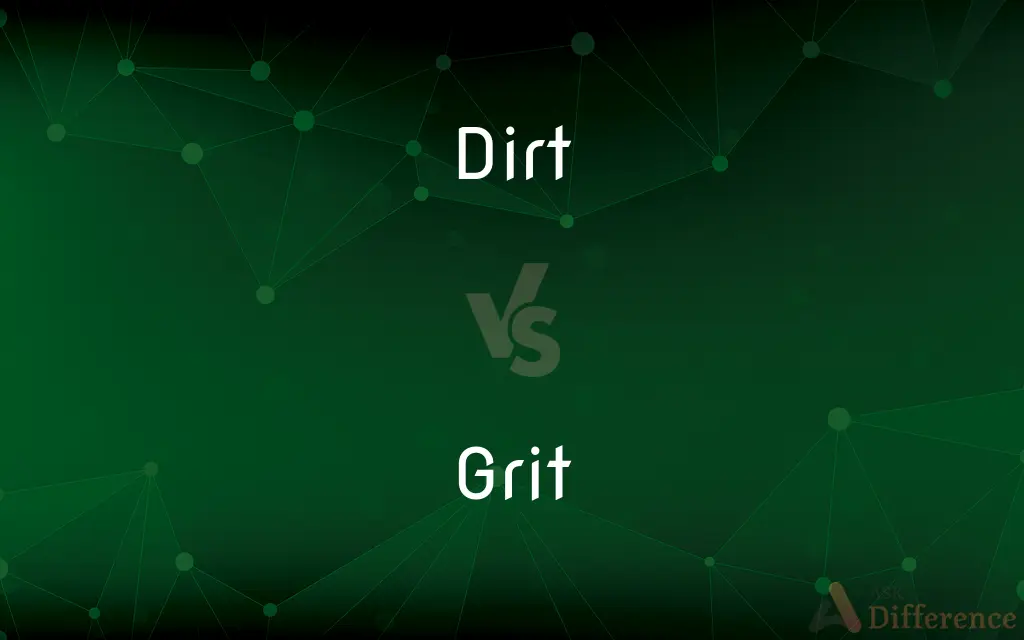Dirt vs. Grit — What's the Difference?
By Tayyaba Rehman & Maham Liaqat — Updated on March 27, 2024
Dirt refers to loose soil or earth, often considered unclean, while grit signifies small, hard particles of sand or stone, or metaphorically, courage and resolve.

Difference Between Dirt and Grit
Table of Contents
ADVERTISEMENT
Key Differences
Dirt is commonly understood as loose soil, dust, or any substance that causes something to be unclean. It is often associated with the ground or the surface of objects in an environment considered to be in need of cleaning. Grit, in its physical sense, refers to small, coarse particles of sand or stone. Metaphorically, grit represents perseverance and determination in the face of challenges.
While dirt can be seen as undesirable or something to be removed from surfaces, clothes, or other objects to maintain cleanliness, grit has a dual nature. Physically, it is valued for its abrasive qualities, useful in processes like sanding or grinding. Metaphorically, grit is admired as a positive personal trait, indicative of an individual's resilience and tenacity.
The presence of dirt is typically unwanted, suggesting neglect or poor hygiene, and can have negative health implications if found in excessive amounts in living or working spaces. On the other hand, grit, especially in its non-physical sense, is sought after and cultivated as it is associated with success, the ability to overcome obstacles, and the strength to pursue long-term goals.
In terms of application, dirt is often dealt with using cleaning methods and is a common byproduct of various natural and human activities. Grit, however, is deliberately used in certain contexts, such as in construction or manufacturing, for its ability to erode or smooth surfaces, and metaphorically, it's developed through experiences that challenge and build character.
Despite their differences, both terms can evoke the idea of the earth or ground, with dirt directly referring to the substance itself, and grit implying a quality that might be metaphorically drawn from the earth’s steadfastness and resilience. Their contrasting uses and connotations highlight the diverse ways in which similar concepts are perceived and utilized in language and life.
ADVERTISEMENT
Comparison Chart
Definition
Loose soil or earth; general uncleanliness.
Small, hard particles of sand or stone; courage and resolve.
Connotation
Often negative, associated with uncleanliness.
Positive, especially in metaphorical use, related to resilience.
Physical Use
Cleaning and removal from surfaces.
Abrasion, traction, or filtration.
Metaphorical Use
Less commonly used metaphorically.
Represents determination and perseverance.
Desirability
Generally undesirable.
Desirable, particularly as a personal quality.
Compare with Definitions
Dirt
Symbolically, can represent moral impurity or gossip.
The article dug up a lot of dirt on the celebrity's past.
Grit
Small, hard particles of sand or stone.
The grit on the path made it easier to walk on without slipping.
Dirt
Substances that make a surface or object unclean.
The old book was covered in years of accumulated dirt.
Grit
Used in various industries for grinding, sanding, or providing traction.
The workers spread grit on the road to prevent ice formation.
Dirt
Earth or soil, especially when loose.
She wiped the dirt off her shoes before entering the house.
Grit
A quality admired in individuals facing difficult challenges.
Her grit was evident as she persisted through the marathon despite the pain.
Dirt
In gardening or agriculture, refers to the medium in which plants grow.
He added compost to the dirt to enrich it for planting.
Grit
In educational or psychological contexts, refers to persistence and passion for long-term goals.
His success was more a testament to his grit than to his talent.
Dirt
A term often used to signify something undesirable or out of place.
After the picnic, they cleaned up all the dirt and litter.
Grit
Courage and resolve; strength of character.
It took a lot of grit to stand up to the bullies.
Dirt
Dirt is unclean matter, especially when in contact with a person's clothes, skin or possessions. In such case they are said to become dirty.
Grit
Small loose particles of stone or sand
She had a bit of grit in her eye
Dirt
Earth or soil.
Grit
Courage and resolve; strength of character
I've known few men who could match Maude's grit
Dirt
A filthy or soiling substance, such as mud or dust.
Grit
Spread grit and often salt on (an icy road)
The main roads in Plymouth will be gritted from 6.30 p.m. tonight
A council gritting lorry
Dirt
Excrement.
Grit
Grate
Fine red dust that gritted between the teeth
Dirt
A squalid or filthy condition.
Grit
Minute rough granules, as of sand or stone.
Dirt
One that is mean, contemptible, or vile.
Grit
The texture or fineness of sand or stone used in grinding.
Dirt
Obscene language or subject matter.
Grit
A coarse hard sandstone used for making grindstones and millstones.
Dirt
Malicious or scandalous gossip.
Grit
(Informal) Indomitable spirit; pluck.
Dirt
Information that embarrasses or accuses.
Grit
To clamp (the teeth) together.
Dirt
Unethical behavior or practice; corruption.
Grit
To cover or treat with grit.
Dirt
Material, such as gravel or slag, from which metal is extracted in mining.
Grit
To make a grinding noise.
Dirt
Soil or earth.
Grit
A collection of hard small materials, such as dirt, ground stone, debris from sandblasting or other such grinding, or swarf from metalworking.
The flower beds were white with grit from sand blasting the flagstone walkways.
Dirt
A stain or spot (on clothes etc); any foreign substance that worsens appearance.
Grit
Sand or a sand–salt mixture spread on wet and, especially, icy roads and footpaths to improve traction.
Dirt
Previously unknown facts, or the invented "facts", about a person.
The reporter uncovered the dirt on the businessman by going undercover.
Grit
Inedible particles in food.
These cookies seem to have grit from nutshells in them.
Dirt
(figurative) Meanness; sordidness.
Grit
A measure of the relative coarseness of an abrasive material such as sandpaper, the smaller the number the coarser the abrasive.
I need a sheet of 100 grit sandpaper.
Dirt
(mining) In placer mining, earth, gravel, etc., before washing.
Grit
(geology) A hard, coarse-grained siliceous sandstone; gritstone. Also, a finer sharp-grained sandstone, e.g., grindstone grit.
Dirt
Freckles
Grit
Strength of mind; great courage or fearlessness; fortitude.
That kid with the cast on his arm has the grit to play dodgeball.
Dirt
To make foul or filthy; soil; befoul; dirty
Grit
Husked but unground oats.
Dirt
Any foul of filthy substance, as excrement, mud, dust, etc.; whatever, adhering to anything, renders it foul or unclean; earth; as, a wagonload of dirt.
Whose waters cast up mire and dirt.
Grit
Coarsely ground corn or hominy used as porridge.
Dirt
Meanness; sordidness.
Honors . . . thrown away upon dirt and infamy.
Grit
Apparently only in grit one's teeth: to clench, particularly in reaction to pain or anger.
We had no choice but to grit our teeth and get on with it.
He has a sleeping disorder and grits his teeth.
Dirt
In placer mining, earth, gravel, etc., before washing.
Grit
To cover with grit.
Dirt
To make foul of filthy; to dirty.
Grit
To give forth a grating sound, like sand under the feet; to grate; to grind.
Dirt
The part of the earth's surface consisting of humus and disintegrated rock
Grit
Sand or gravel; rough, hard particles.
Dirt
The state of being covered with unclean things
Grit
The coarse part of meal.
Dirt
Obscene terms for feces
Grit
Grain, esp. oats or wheat, hulled and coarsely ground; in high milling, fragments of cracked wheat smaller than groats.
Dirt
Disgraceful gossip about the private lives of other people
Grit
A hard, coarse-grained siliceous sandstone; as, millstone grit; - called also gritrock and gritstone. The name is also applied to a finer sharp-grained sandstone; as, grindstone grit.
Dirt
(of roads) not leveled or drained; unsuitable for all year travel
Grit
Structure, as adapted to grind or sharpen; as, a hone of good grit.
Grit
Firmness of mind; invincible spirit; unyielding courage; fortitude.
Grit
To give forth a grating sound, as sand under the feet; to grate; to grind.
The sanded floor that grits beneath the tread.
Grit
To grind; to rub harshly together; to grate; as, to grit the teeth.
Grit
A hard coarse-grained siliceous sandstone
Grit
Fortitude and determination;
He didn't have the guts to try it
Grit
Cover with a grit;
Grit roads
Grit
Clench together;
Grit one's teeth
Common Curiosities
Is dirt always considered negative?
While often associated with uncleanliness or mess, dirt can also be neutral or positive, depending on the context, such as in gardening or earth sciences.
How is grit used in everyday language?
Beyond its physical description, grit is commonly used to commend someone’s determination and resilience in overcoming obstacles or achieving long-term goals.
What is the primary difference between dirt and grit?
Dirt primarily refers to loose soil or filth, while grit refers to small, coarse particles and, metaphorically, to courage and perseverance.
How do the metaphorical meanings of dirt and grit differ?
Dirt, metaphorically, can suggest moral impurity or unsavory gossip, whereas grit metaphorically signifies admirable personal qualities such as perseverance and tenacity.
How is grit applied in practical settings?
Practically, grit is used for purposes like creating traction on icy roads, in abrasive materials for sanding or grinding, and in filters for water purification.
Can the presence of dirt be beneficial?
Yes, in contexts like gardening, agriculture, or natural ecosystems, dirt (as soil) is essential for plant growth and environmental health.
Is there a relationship between physical and metaphorical grit?
Yes, the metaphorical use of grit draws from the physical characteristics of small, hard particles, symbolizing the toughness and resilience required to endure and overcome challenges.
Can grit be considered a type of dirt?
Physically, grit can be a component of dirt, especially in contexts where dirt contains sandy or stony particles. However, their uses and connotations differ significantly.
Why is grit valued in individuals?
Grit is associated with the strength of character, the ability to persevere through challenges, and the commitment to achieving significant objectives, qualities that are highly regarded in various aspects of life.
What makes dirt undesirable in many contexts?
Dirt is often considered undesirable because it signifies uncleanliness, disorder, or neglect, leading to efforts to clean or remove it from living and working environments.
Share Your Discovery

Previous Comparison
Gallup vs. Gallop
Next Comparison
Close vs. CloserAuthor Spotlight
Written by
Tayyaba RehmanTayyaba Rehman is a distinguished writer, currently serving as a primary contributor to askdifference.com. As a researcher in semantics and etymology, Tayyaba's passion for the complexity of languages and their distinctions has found a perfect home on the platform. Tayyaba delves into the intricacies of language, distinguishing between commonly confused words and phrases, thereby providing clarity for readers worldwide.
Co-written by
Maham Liaqat













































